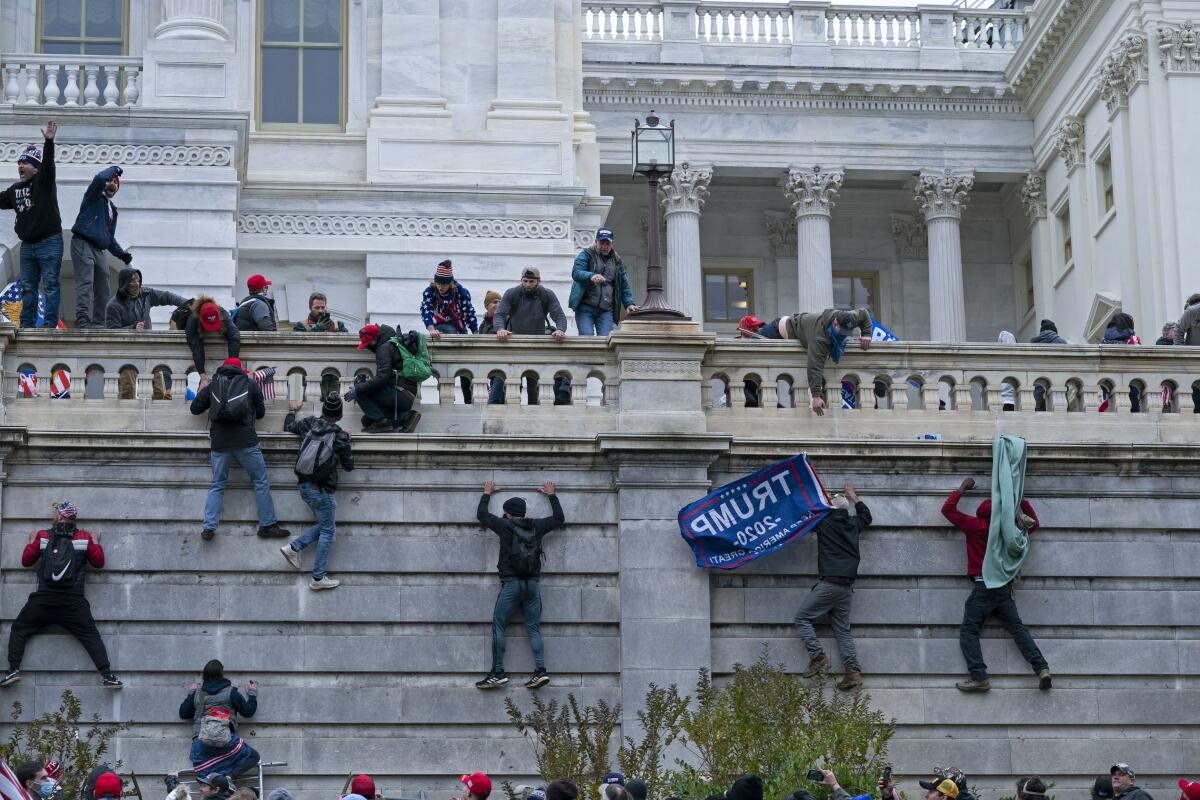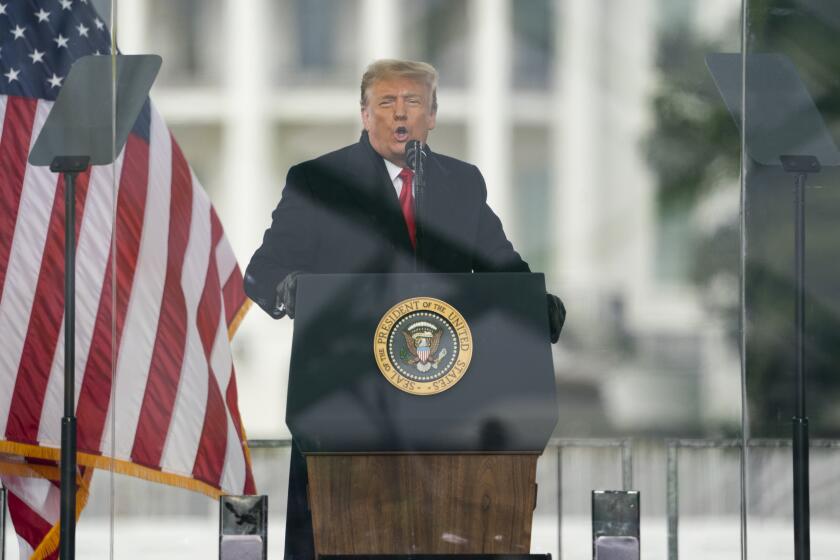Congress asks tech firms to keep communications records for Capitol riot probe

- Share via
WASHINGTON — A House committee investigating the Jan. 6 U.S. Capitol insurrection has requested that telecommunications and social media companies preserve the personal communications of hundreds of people who may have been connected to the attack. It’s a sweeping public demand from Congress that is rare, if not unprecedented, in its breadth and could put the companies in a tricky position as they balance political and privacy interests.
The committee, which is just beginning its probe, did not ask the 35 companies to turn over the records — yet. In letters Monday, the panel asked them to save the records as part of the investigation into the violent mob of former President Trump’s supporters who stormed the building that day and interrupted the certification of President Biden’s victory.
Republicans immediately criticized the request, including Trump, members of his family and several GOP lawmakers, according to a person familiar with the confidential request and who requested anonymity to discuss it.
House Republican leader Kevin McCarthy of Bakersfield, who is hoping to become speaker of the House if his party wins the majority in the 2022 midterm election, directly threatened the companies, tweeting that “a Republican majority will not forget” if they turn over information.
A look at what the panel is asking for, why lawmakers want it and the potential legal issues surrounding the request:
What the committee wants
The committee sent letters to the 35 companies Monday, part of its larger probe into what happened Jan. 6 as Trump supporters beat police, broke through windows and doors and sent lawmakers running for their lives. The letters request that the companies “preserve metadata, subscriber information, technical usage information, and content of communications for the listed individuals” from April 2020 to Jan. 31.
The request includes the “content of communications, including all emails, voice messages, text or SMS/MMS messages, videos, photographs, direct messages, address books, contact lists, and other files or other data communications.”
Far-right groups like the Proud Boys and Oath Keepers are planning to attend a rally this month at the U.S. Capitol in support of people charged in January’s insurrection.
The panel released the letters publicly but withheld the names on the list, which Chairman Bennie Thompson (D-Miss.) said last week numbered in the “hundreds.”
The companies that received the letters include social media giants Facebook, Twitter and TikTok; telecommunications companies such as AT&T and Verizon; and the conservative and far-right platforms Parler, 4chan and theDonald.win.
The panel has also requested that 15 social media companies provide records about misinformation, foreign influence and domestic extremism on their platforms related to the 2020 election. But the requests to preserve personal communications raise unique questions about the relationship between the technology companies and Congress.
Why they want it
Democrats have said they will examine all aspects of the attack — including what Trump was doing in the White House as it unfolded. Several Republican lawmakers talked to the president that day, and many of them have strongly supported his lies about widespread fraud in the election.
In the days immediately following the attack, House Speaker Nancy Pelosi (D-San Francisco) suggested that some Republican lawmakers might have been connected to the far-right supporters who stormed the building or were involved in the planning. There is no evidence that’s true, but Democrats have said that they would look into all possible leads.
In the letters, the committee wrote that “the inclusion of any individual name on the list should not be viewed as indicative of any wrongdoing by that person or others.”
U.S. Capitol Police officers who were attacked during the Capitol riot are suing former President Trump, his allies and members of far-right extremist groups.
GOP pushback
McCarthy issued a blistering statement Tuesday evening on Twitter, saying the Democrats’ efforts “would put every American with a phone or computer in the crosshairs of a surveillance state run by Democrat politicians.”
He also said that, if the companies turned over private information, they would be “in violation of federal law and subject to losing their ability to operate in the United States.”
It is unclear what federal law the companies would be violating and how they would be subject to losing their ability to operate. McCarthy’s office did not respond to a request for comment.
To comply or not to comply?
If the committee does eventually ask for records, the decision on whether to comply, even partially, could be difficult for companies that want to cooperate but are also wary of turning over the private communications of lawmakers to their political rivals. And because the request would be from Congress, and not law enforcement, the issue becomes more complicated.
Telecom and tech companies field requests all the time from law enforcement and the courts to turn over private information, and they often comply. Even though the congressional committee has subpoena power, the calculation on whether to cooperate with Congress is often as much of a political question as a legal one. Democrats are in the majority, but Republicans could take over with a favorable election map in 2022.
Get our L.A. Times Politics newsletter
The latest news, analysis and insights from our politics team.
You may occasionally receive promotional content from the Los Angeles Times.
There are also regulatory and public relations factors. It’s highly likely that the issue could be tied up in courts.
“It’s as much about the law as it is about the optics,” said G.S. Hans, a law professor at Vanderbilt University who specializes in 1st Amendment law and technology policy. He said the companies are likely “talking about this from the general counsel’s office but also from their lobbying arms, because I think it’s both things at once.”
The sweeping preservation request from Congress, he says, is “a new situation” for many of them.
Most of the companies on the list declined or did not respond to requests for comment, including AT&T, Verizon, T-Mobile, U.S. Cellular, Apple, Amazon, Microsoft, Twitch, Twitter and TikTok.
Two companies, Reddit and Facebook, sent short statements saying they would comply with the committee’s requests.
More to Read
Sign up for Essential California
The most important California stories and recommendations in your inbox every morning.
You may occasionally receive promotional content from the Los Angeles Times.












